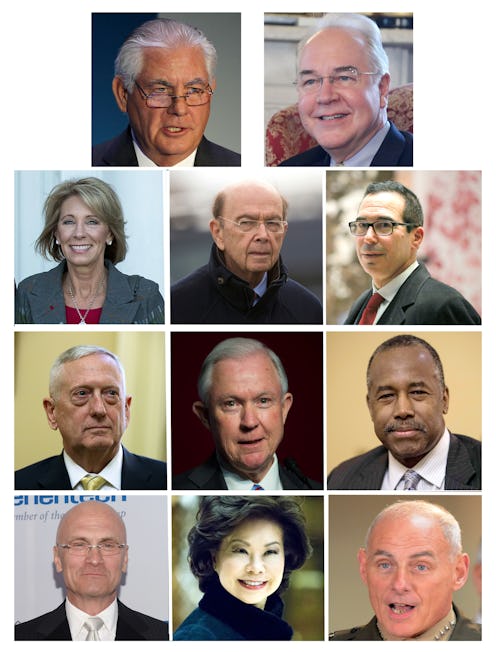News
The Missing Demographic In Donald Trump's Cabinet
For the first time since Ronald Regan's tenure, the Presidential Cabinet may not have any high-ranking Latinx members. Buzzfeed reported Thursday that Donald Trump has yet to appoint any Latinxs to his team of top advisers, and the window is rapidly closing as the highest profile positions fill up. Leaving Latinxs out of top executive positions would render nearly 20 percent of the population representation-less in the highest echelons of government for the next four years, and send another message to Latinxs that the Republican party doesn't have a place for them.
The last best hope for a Latinx in the Cabinet was Representative Raul Labrador of Idaho, who was reportedly under consideration for the interior secretary position, according to Politico. However, the Trump transition team announced earlier this week that Montana Representative at large Ryan Zinke will fill the position come January. Trump didn't have a whole lot of options for experienced Latinx bureaucrats to run the Interior — of the mere 37 Latinx members of Congress (less than 10 percent of the 535 bicameral body), only eight are Republicans, and two of those are Trump's former rivals, Senators Ted Cruz and Marco Rubio.
It's not exactly surprising that the president-elect didn't bother to appoint even a single Latinx to the Cabinet given his previous, incredibly racist statements about the demographic, but Trump's disregard for the need of Latinx representation in higher government is emblematic its very existence.
Latinxs aren't monolithic, of course, and appointing a single Latinx (though let's be honest, it would be a Latino) isn't going to do much to represent diverse interests. In fact, appointing a Republican Latinx wouldn't represent many Latinxs at all — according to the Pew Research Center, less than 30 percent of registered Latinx voters belong to the Republican party, though that number has been on the rise since 2011. Trump may think that his success with this key demographic during the election means Latinxs love him unconditionally, but continuing to turn the Latinx tide toward to the GOP will require millennials' support, which seems unlikely without better representation within the party.
Without a single Latinx in the Cabinet, it's hard to call Trump's a presidency for the people. The overt and subtle racial themes in the campaign seem to have come back to play in the appointment process, and it will hopefully serve as a wake-up call for Latinx Trump supporters who hoped to make new ground in American politics and culture. The exclusion of Latinxs from the White House's top teams solidifies the perception that the Republican party wants Latinx votes, but not their input.
